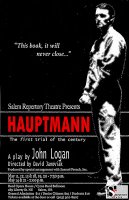 I saw this play last week (in fact I'm seeing it again tomorrow night). It was as brilliant as the review below explains. Compelling and dignified. Modest but certain in its revelations. Well cast, with an appropriately spartan stage design.
I saw this play last week (in fact I'm seeing it again tomorrow night). It was as brilliant as the review below explains. Compelling and dignified. Modest but certain in its revelations. Well cast, with an appropriately spartan stage design.The lighting was indeed "ambitious and sophisticated in execution."
Plus, I've got a thing for the Assistant Stage Manager...
Storytelling, cast excel in play about the Lindbergh trial
by Ron Cowan
Statesman Journal
May 15, 2006
By now, cases such as the Lindbergh kidnapping trial of the 1930s seem quite familiar: media overkill, celebrities galore, a lackluster judiciary and expert witnesses by the truckload.
But the subject of John Logan's "Hauptmann," now at Salem Repertory Theatre, still takes on mythic proportions, pitting the anguish of an iconic American family against the fate of a befuddled German immigrant.
Logan, better known for writing films such as "Gladiator" and "The Last Samurai," throws in some allusions to the contrary but pretty much comes down on the side of the defendant, Bruno Richard Hauptmann (Jason Haines). Hauptmann virtually was defenseless against the world of Charles and Anne Morrow Lindbergh and a $1 million prosecution case.
Tautly directed by David Janoviak, with a flair for the dramatic, this is nonetheless involving entertainment, rich with the tapestry of a different era and an almost mythic mix of characters and events.
Did he or didn't he do it? It's never quite certain, though Hauptmann was found in possession of $14,000 of the $50,000 ransom for the baby and later found dead, and the prosecution had both compelling and improbable evidence.
What is more intriguing here is the touching of two distinctly different worlds, the wealth and celebrity of the Lindberghs and the impoverished, troubled life of the immigrant, automatically doubted when questions of guilt and innocence are raised.
Tormented by the police and without adequate legal support (having only an overwhelmed lawyer and $4,000 to mount a case), Hauptmann is little more than an observer hoping for the best and proclaiming his innocence to the end.
One of this play's strengths is its unconventional format, opening just before Hauptmann's execution in 1936 and flashing back to tell the story of the characters and the kidnapping, setting the scene, and then progressing through the drama of the trial.
Other than Haines, cast members play several roles, stepping in and out of characters as the play goes back and forth in time.
Haines is a profoundly affecting figure as Hauptmann, a bewildered and sympathetic man played with a German accent. He addresses the audience directly and participates in the action, letting us know he is telling his story so it can't happen again.
Another strong performer is Thomas Nabhan, particularly in the role of the determined prosecutor in the trial sequence, relentlessly berating poor Hauptmann and guiding his sometimes suspicious experts.
Peter Armetta, who plays a variety of expert witnesses and the odd Dr. John Condon, who inserted himself into the case as a go-between with the kidnappers, is particularly versatile at changing characters.
The excellent cast includes Susan Coromel, Josiah Bania, Tim Jaeger and Dawnie Drebin, all of whom elicit telling details in a variety of characters.
The set by Scott Grim, a gray courtroom/jail setting, does a lot with a little, and his lighting, using an expanded lighting grid, is ambitious and sophisticated in execution. Rebecca Turk's costumes suggest the era, without overdoing the nostalgia.
"Hauptmann" is not lighthearted fare, which has given SRT its greatest success so far, but it is the measure of a professional company that is willing to challenge and reward an audience with edgy and uncompromising theater.

No comments:
Post a Comment